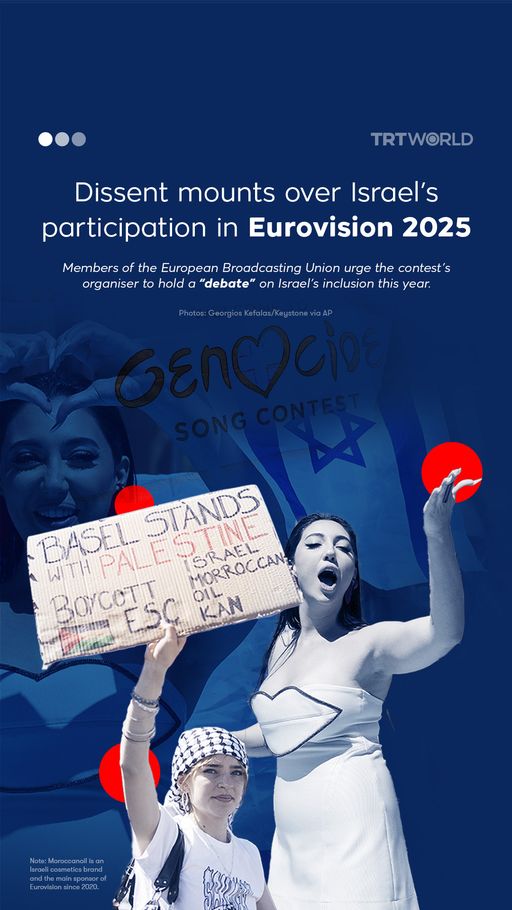As Eurovision 2025 gears up for its grand finale on May 17 in Basel, Switzerland, the world’s largest televised music competition is once again under fire — not for its performances, but for its politics.
This year’s contest, the 69th edition, comes amid intensifying global criticism over the European Broadcasting Union’s (EBU) decision to allow Israel to participate, despite documented war crimes in Gaza, ongoing occupation, and calls for accountability from the international community.
At the heart of the backlash is the EBU’s selective neutrality.
In 2022, Russia was swiftly ejected from the competition following its military campaign in Ukraine.
Yet, despite Israel’s ongoing carnage in Gaza, which has left tens of thousands dead and sparked charges of genocide from South Africa at the International Court of Justice, the EBU insists Eurovision is “not a political event.”
However, for many artists and audiences, that stance no longer holds.
‘No applause for genocide’
Protests have already marked this year’s opening ceremony, held on May 11. As Israeli contestant Yuval Raphael walked the turquoise carpet in Basel, demonstrators held signs reading “No applause for genocide” and “Singing while Gaza burns.”
Boos were heard amid the usual fanfare.
A commentator on Eurovision, Dean Vuletic, said, there have been peaceful pro-Palestinian protests, including the opening ceremony.
“But those protests were peaceful and the event also continued as planned, so the situation in Basel is definitely not as intense as it was last year in Malmo,” he tells TRT World.
This year’s Eurovision also saw a first in its history: more than 70 former contestants — including past winners Charlie McGettigan and Salvador Sobral, as well as French pop star La Zarra, and the UK’s Jewish artist Mae Muller — signed an open letter demanding Israel’s disqualification.
“KAN is complicit in Israel’s genocide against the Palestinians in Gaza and the decades-long regime of apartheid and military occupation against the entire Palestinian people,” the letter said.
While calling the 2024 edition “the most politicised, chaotic, unpleasant in the competition’s history,” they accused the EBU of complicity in “Israel’s genocide”.
They also claimed the organisation is “normalising and whitewashing” Israel’s war crimes.
“We believe in the unifying power of music, which is why we refuse to allow it to be used as a tool to whitewash genocide,” the letter states.
“Last year, we were appalled that the EBU allowed Israel to participate while it continued its genocide in Gaza, broadcast live for the world to see. The result was disastrous… Silence is not an option.”
The letter compares Israel’s inclusion to Russia’s exclusion in 2022, calling out what they see as a double standard: “The EBU has already demonstrated it is capable of taking measures... We don’t accept this double standard regarding Israel.”
While the letter is unlikely to affect this year’s show, with Israel still slated to perform, its message has reverberated across Europe.

Zionism behind the balcony
Israeli contestant Raphael will perform in the second semifinal on May 15 and is considered a potential contender to advance to the finals.
But even her presence and stage plan are founded on Zionism.
After weeks of secrecy, Israel revealed details of her staging: she will appear alone, dressed in black, beside a climbable chandelier and a balcony — the latter described by Israel’s broadcaster KAN as a symbolic reference to the forefather of Zionism, Theodor Herzl, who famously looked out from a balcony in Basel during the Fifth Zionist Congress in 1901.
As calls for a boycott intensify and protests erupt across Switzerland and beyond, the question remains: Can a music contest built on unity, peace, and inclusion afford to ignore the realities playing out on the world stage?
Or as one protester’s sign in Basel put it plainly: “You can’t sing while Gaza burns.”
















